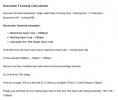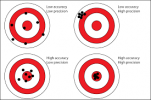azrivest
Chasing the rDream
- Joined
- Jul 15, 2020
- Messages
- 2,189
Question on heart rate tracking: When I google "max heart rate" it tells me to subtract my age from 220. However, my watch has measured heart rates up to 203 when I'm exercising, and I'm not 17. What gives? And how do I use that information for better running? Lately I've been trying to keep my easy runs under about 150 bpm (though I'm not always successful), but that's a little arbitrary. Any advice is appreciated!
220 - age for max HR is an arbitrary measure, and is more likely to be wrong than right. Same for Phil Maffetone's 180 - HR for his MAF training zone. None of these are based on scientific data. Maffetone has admitted that he determined his formula just to force runners to stay at a low heart rate when running
Ideally, you would do some kind of max HR test, like a lactate threshold time trial. And as striker1064 said, watches can often get stuck in cadence lock.





